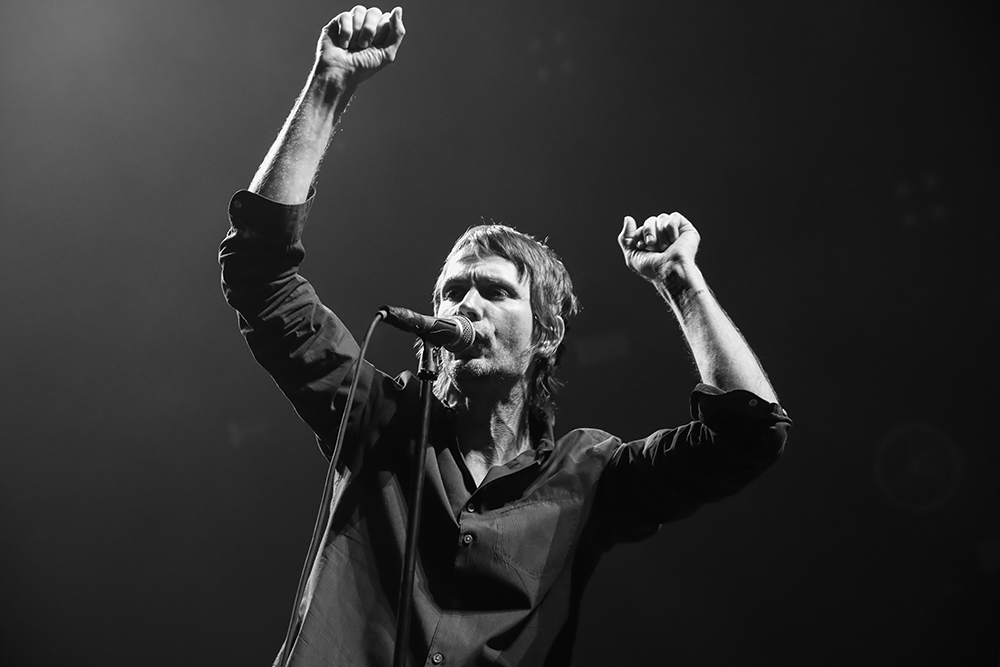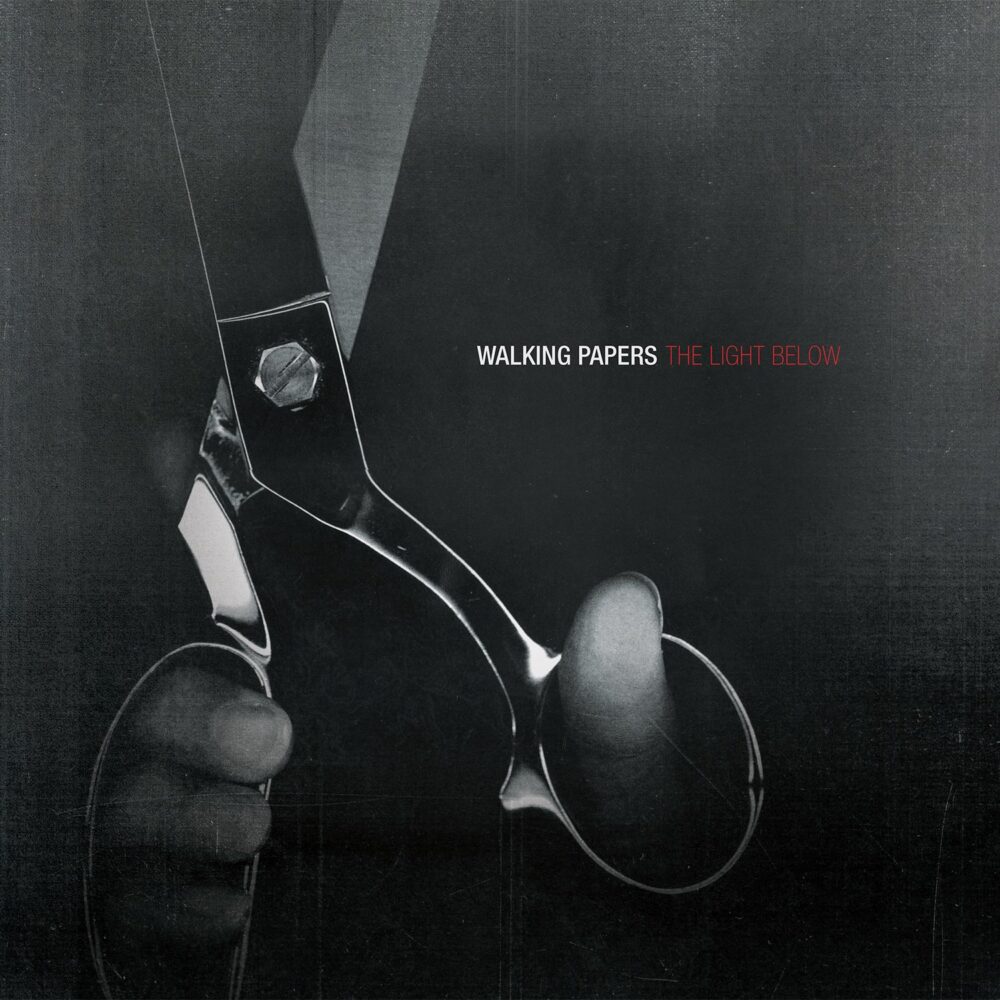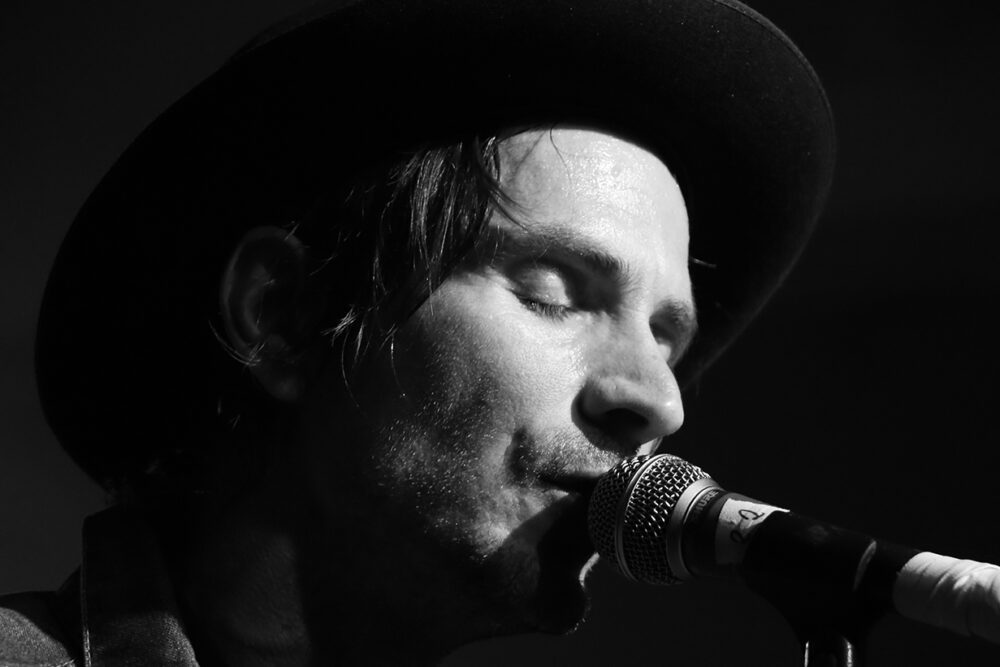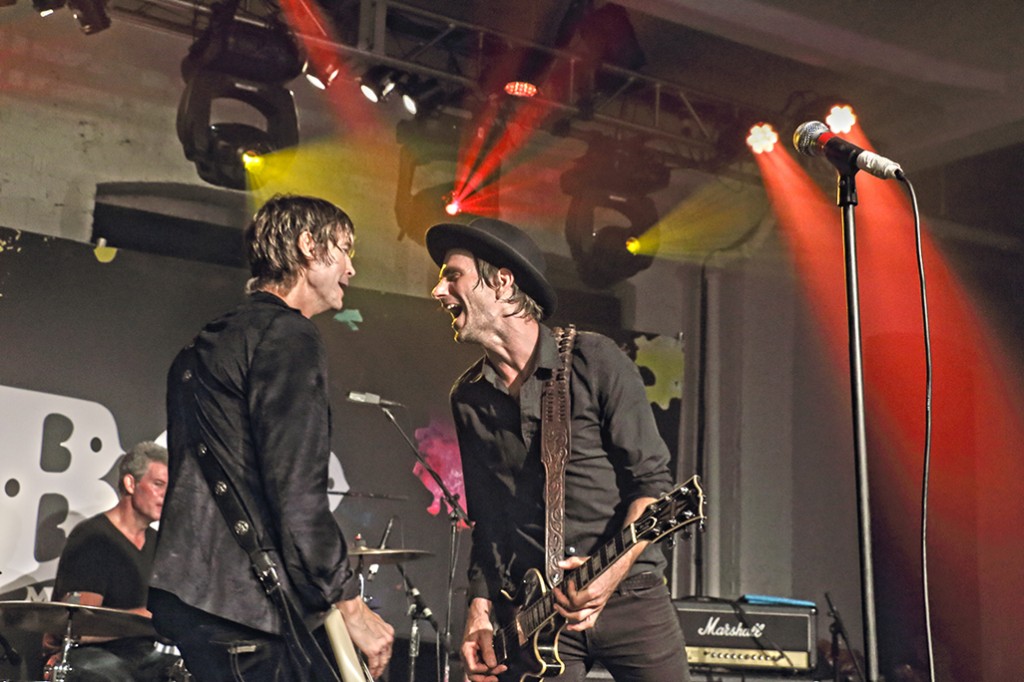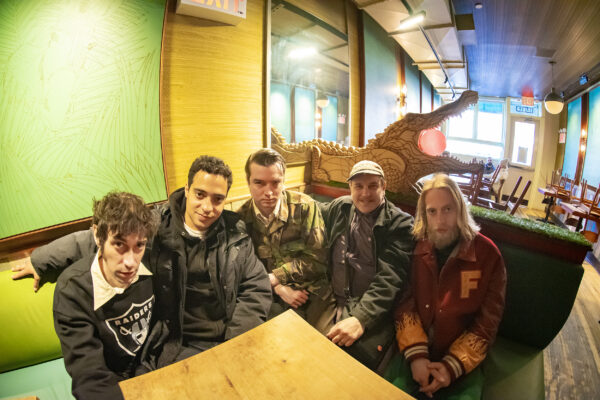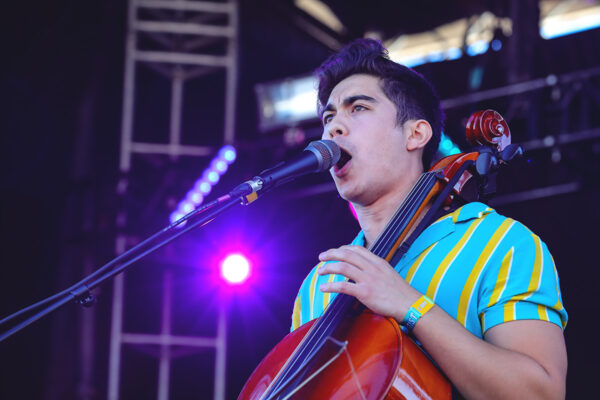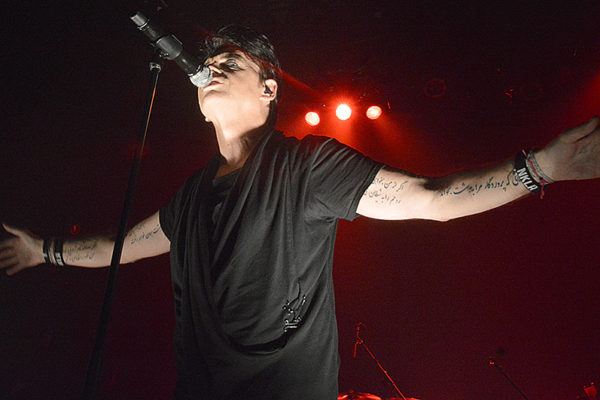I was pretty sure I’d caught him. Jeff Angell once mused that he’s never written a happy song. “I’ve tried and failed a couple of times. I haven’t nailed it yet, but I’m working on it,” he told me backstage at NYC’s Mercury Lounge in 2018. Now, a little over two years later, Walking Papers’ cinematic third LP, The Light Below, contains a reassuring hymn called “Going Nowhere.” A little bit of happiness seems evident in its moving melody, and in moments like “…I’ll do what I can for the feeling I get when you call me your man.” So I started our call with my happy song theory. “I think there’s parts of it that are happy,” Angell said amusedly. “I mean, it’s positive, but there’s some fuckin’ negativity in there, don’t try to…” he trailed off laughing. I replied, “I know; you’re still talking about drinking poison, but at least you’re choosing not to.” “I do think that song’s trying to be a positive sweet song,” he conceded warmly. “That song was pretty special and came pretty fast. I had this whole thing: ‘The feeling found roots at a difficult age / And the fruit it produced soured with rage.’ That’s what got me going, and that’s based on people in their adolescent years, when so much damage is done, and how those things live with them through their life. So I think some part of the song is trying to be sweet and loyal. Other parts are trying to explain why people are intense or difficult sometimes. The song’s basically straight to my wife. The song is trying to say, ‘What’s the big problem here? Come on, man,’” he said playfully. “‘I’m a pain in the ass, but I’m loyal. I chew up your shoes and I once in a while relieve myself on the carpet, but I’m loyal.’”
There’s been a lot of buzz surrounding The Light Below – the powerful and suspenseful rock journey from Angell, Benjamin Anderson, Will Andrews, and Gregor Lothian. Its cover art, showing a hand using a pair of scissors, echoes a line that recurs in two songs: “I’m the scissors, you’re the string” – so of course, we talked about the symbolism. “Well that’s an eighty dollar pair of scissors right there,” Angell said in a funny hushed tone, as if that was the biggest secret of all. “These scissors are not cheap. But I actually saw a friend of mine’s play, and they were talking about the Fates – the three Fates of Greek mythology. They had the string of life and they would cut it; like in the Hercules children’s movie. So I saw this play. I also thought that scissors are kind of like the hands of a clock; the visual of scissors is cool. And I used to have this t-shirt with two stick figures on it – one of my favorite t-shirts. One stick person had an umbrella with rain coming down, and the other person was standing there with no umbrella, with rain coming down on them. And over the umbrella person, it said, ‘me,’ and over the no-umbrella person, it said, ‘you.’ So when I thought about the scissors and the string, I was thinking, ‘I don’t want to be the string.’ It’s like the ‘What Did You Expect?’ song. I like the idea of cutting the past, or certain things that aren’t healthy for you; just severing that and moving on from it. And I think about that a lot.”
One instance of that scissors line happens during “Money Isn’t Everything,” a dark song built upon a striking beat by Will Andrews. Having seen comments about that track in the fan group, my next question was about its familiar reference to “ancestors’ ashes.” “That lyric, I actually stole from this song called, ‘This Town,’ which we tried to record like three times and we just couldn’t make it happen,” Angell explained humorously. “It sounded like a Green Day song or something; just didn’t fit who we are. There’s probably a recording of it on YouTube because we played it; it had a lot of energy. When we first started playing it, we didn’t have enough songs to fill out a whole night, so we added in a couple new ones. So I did have those lyrics and I stole ‘em from that one and made it into this song, and I think this song’s better. The ancestors’ ashes theme was inspired by the Chief Seattle speech. I thought it was amazing. I always liked the Native American vibe of ‘Leave the land better than you found it.’ So that’s where that line came from. I’ve been holding onto that idea: ‘Hey we’re going to burn down your villages and rape you, and then later on, we’re going to name our cities after you. After we do everything wrong, we’re going to try to make it up by naming this street after your uncle.’” And on “Money Isn’t Everything,” Angell made the courageous choice to portray the bad guy as opposed to just describing him. “Sometimes, the only way to say that is to be the asshole. In the songs, that’s the fun thing with these character studies. I can be a person in the song who is often not me. Sometimes, somebody will hear a song I wrote and they’ll think it’s a love song or about a relationship or something – when it’s actually about a friend who owes you twenty bucks! You write some little thing down and you keep it. And you think, ‘Well, that’s not really going to work unless I turn it into a song that’s more universal for people.’ But I wouldn’t let the truth stand in the way of a good song.”
“Most ideas [in The Light Below] came from the word collage,” said Angell, referring to the huge repository of ideas he had once shown me on his laptop. “I’m always digging from there. I have a thing for a song and then these sparks of inspiration spill out, and once in a while, they get pretty damn close to a thing. Sometimes, that spark of inspiration just becomes a word collage that later gets turned into a song. Other times, I have a song and I need a lyric, so I start digging through there to find a lyric. I went through all of my journals and I filed ideas in green, red, and blue. I went through and I archived all of the stuff that I thought was the best. Red was for relationship songs, green was for political songs, and blue was for something else that was philosophical or esoteric; red being your heart, blue being the sky, and green being money – green for greed; greed and envy. I was just finding I didn’t really want to spend too much time writing love songs. I feel like that’s a rut that guys get into. And at that point, if you’ve really got a broken heart, then you should write a broken heart song, because it’ll do great and it’ll resonate in the universe because it’s true, right? But if you’re just trying to finish a song, so you’re using these cheap lyrics, then that’s an easy way out, and you’re not challenging yourself as an artist. So I was trying to go, ‘Well, what, really, is my world at this particular moment?’ And that is my world. It has been for the last couple of years; just trying to work on my own cognitive processing and trying to become a better person by thinking differently.”
“Eventually, the ideas hang around and then they come together. I think the biggest thing is, if it’s not there yet – to not let it out. Like sometimes you’re sitting on that idea and you know it can be a good idea. You want to just finish the song, but you know something’s gonna be better, if you just wait a while. Then you bounce over and work on something else, and then you come back to it. And that’s how I’m kind of a plate-spinner. I’m looking at twenty different songs at the same time. And maybe ten of those get finished in time. I think that right now, this is a good record for these times, because what we don’t need is something that stresses everybody out and is all jittery and high-strung. People are already pissed. Everybody is so anxious and wound up with all of this lockdown shit.” I then asked if the pandemic had affected the record in any way. “No, I would say more that the last four years of political rigamarole set us in the direction of wanting to make something that was a little bit more like someone talking to you and less like someone screaming at you. That was intentional, and we also wanted to stay away from barn-burner songs. Barn-burners are fast and made to rile up an audience and kick ass to. I think the Staticland record had a lot of that; a lot of fast songs, cruising along – and even the second Walking Papers record [WP2] did. I felt like I just wanted to take a break from that for a minute. Records are good for different things. I feel like some things are an easy trick. I know those tricks, and to my own demise, sometimes I ignore those tricks, when maybe I shouldn’t. But certain songs, you know where they’re going and you know where they started and you know they have a purpose.”
“Now I do like a song with a lot of energy, like when I’m trying to do work or cleaning out the garage or getting pumped up to do something. And at a rock show, I love getting pummeled by a band that’s just brutal and intense and they play at a tempo that gets your blood pressure boiling. I like that. But it’s kind of not too hard to do that. You just get loud. You don’t even have to have a good song; you can get that energy with a shitty song in which the riff just repeats. So it is a good trick, but I wanted to try something different this time. Ben [Anderson] and I also like a lot of film music and stuff. I looked at my Spotify recap for last year and it was surprisingly all soundtracks. I mean, I’ve listened to a lot of rock throughout my life and I grew up on it, and I love it, but my most-listened-to was this guy Daniel Davies, who did some of the John Carpenter movies. Oh and I liked the Trent Reznor Watchmen soundtrack. That was really cool. And then I’m always doing my Angelo Badalamenti. Those are my faves.” The topic of Badalamenti briefly got us talking Twin Peaks, resulting in a sweet tidbit of early-nineties history. “During Covid, I’ve done a bunch of archiving; putting all my family pictures here and all my music pictures here and cleaning out the closet – all the stuff that you do when you’re stuck in the house. I came across a picture from when I was like sixteen and I had my Laura Palmer shirt on. I had her homecoming queen picture on a t-shirt. I was trying to be a tough rocker dude,” he laughed, “but my shirt was Laura Palmer.” Bringing up another familiar face, we then discussed how Dean DeLeo of Stone Temple Pilots had ended up playing lead guitar on two tracks. “Well, we did a tour with them in Europe,” said Angell. “I’ve known those guys a little bit, through just being a music dude. Those guys are so cool; they’re so fun and their whole tribe is great.”
“When we were touring with them, we pretty much just shared a backstage. They had their own backstage, but we were palling around so much we’d all just drift into each other’s rooms all the time. They’re really cool. We just made friends and stayed in touch. I’m a big fan of his guitar-playing on their Tiny Music… Songs from the Vatican Gift Shop record. Brendan O’Brien produced that record, and DeLeo told me that Brendan O’Brien is apparently a phenomenal guitar player. So I said, ‘Man that record’s so cool,’ and he was like, ‘Well, when the producer’s a better guitar player than you are, you tend to go home and practice and be prepared.’ I always thought that DeLeo had a Joe Perry/Mick Ronson/David Bowie style to his playing. So I just asked him if he wanted to play on a track. I sent it to him, and he sent it back from LA like three days later. It was epic. What’s hilarious about it is, one time, that song got put off to the side when we were working on other songs. And when it came time to fix it, I was at the studio walking from the kitchen or the bathroom or something back into the room and the solo came on, and I was saying to myself, ‘Man, I really killed that solo,’ ‘cause I had forgotten he had played on it. And I was going, ‘Wow I nailed that one.’ It took only like seven seconds for my brain to go, ‘Oh, that’s not me.’ I heard some lick and I was like, ‘That ain’t me.’” Angell let out seven big contagious “HA”s. He then confirmed they hadn’t asked for anything specific from DeLeo. “He played all over the whole song. Some of those parts, we muted it out and brought it in where we wanted it, and he knew that. He said, ‘I’ll give you a solo and jam at the end.’ And there weren’t lyrics at the end yet, so he didn’t really know what was going to happen there. So he was just ripping and then he was very much like, ‘Use what you want and don’t use what you don’t,’ and that’s what we did.”
“Some of the solos at the end – that’s actually me and DeLeo playing back and forth. He didn’t know that I had a part there; and somehow, when it got to him, it wasn’t in there, so he was just doing his own thing. And then I had to make the two things work, but it wasn’t hard. We have the same influences or something; that’s why I was always a fan of his playing – because he plays a style that is what I like. It’s like blues-based, but there’s some feeling and some melody to the solos, where it’s not super metal. Some of these guys play like the eighties never happened, and I kind of like that. ‘Divine Intervention’/’Stood Up at the Gates of Heaven’ is one long song; he didn’t know it was two tracks. He just thought, ‘Holy shit, this song is twelve-and-a-half minutes.’ They were recorded as one piece, and then we put a little edit in there to separate them, so that ‘Divine Intervention’ stands as a really strong song. And that extra four minutes might make it too much for some people to digest; might be a little much for them to bite off. They were two separate ideas that we just started playing together. We went for this approach: when you’re playing live, a lot of times, you’ll blend one song into another and build up to it. When you record a song, it’s immature; it hasn’t been living in the world long. So we wanted to approach it like: ‘What would these songs sound like if we’d already toured and been playing them live for two years?’ We took that approach and those two songs went into each other. But when we were recording it, it was pretty epic because we did it a few times – changed the tempo a little bit slower, a little bit faster and this and that, to find the right spot – but when we played it, we played it for the full twelve and a half minutes. And it was pretty awesome, ‘cause when we were in the studio, we played it pretty much live then – Will and I – and then we added all the other stuff to it. But when we played it, it was like going on a journey every time we did it. It was like ‘Here we go!’ And then you came out feeling like…sustained ecstasy. You were exhausted from the sustained ecstasy of playing it. It was a really cool feeling because I’ve never recorded a song that was that long before.”
We went on to discuss the exciting twelve-plus-minute music video Walking Papers created for “Divine Intervention” and “Stood Up at the Gates of Heaven.” “It was pretty fun. We had no idea where it was going and just kept coming up with ideas as we were rolling. We actually just started with a photoshoot in front of that marquee,” Angell said of the neon sign from 1954 at Seattle’s La Hacienda Motel. “And I was like, ‘Dude, just record that. I’m going to sing along to a song a couple of times.’ That’s where it started. We had no idea what we were going to do. And then once we started with that, then we’re like, ‘Okay, so now we’ve got this hotel thing. What else are we going to do?’ So we said, ‘Let’s rent a room in this shithole!’ We were in the room and we were like, ‘What are we gonna do?’ ‘I don’t know.’ Then we started shooting around these ideas like, ‘My friend has a cool car. Maybe we should park that out front. Maybe it could be in some of the pictures.’ Then we said, ‘It’s snowing! Let’s take this thing and go film this thing.’ We were just standing in front of the car and then we said, ‘Well what if the car is trying to run me over?’ Then, ‘Wait a minute. What if you’re driving the car that’s trying to run me over?’ And it just kept going and going. We did it in two days. It was one of those things that is like how creativity and collaboration is supposed to work: no preconceived notions, no grand idea where someone’s trying to control everything. It just became its own thing. We didn’t even want it to stop; we were having so much fun. That hotel is the real deal. We were in there filming all around that place, and all these people – these are the kind of people who live in those places – were just pulling up their chairs and watching us do our thing. I’m not afraid of those kinds of hotels because I’ve spent a great deal of my life touring around, so I’ve stayed in some pretty shady places. But it’s about as real as they get. Sometimes, we get pretty serious. We definitely have some jokes, but when we get to work, everybody’s really focused. ‘The Value of Zero’ was really fuckin’ fun. We had a lot of laughs doing that one because of the peephole thing, and our big noses and stuff. On this one, we had some fun, but we were really working. We were working hard at making it happen with no real budget. It cost six-hundred bucks, and that includes renting the room and giving our friend some money for his car.”
The Light Below features some unique effects – like the buzz when you touch the end of a guitar cable (in “The Value of Zero”) and a sample of fingers sliding on a guitar string (in “Rich Man’s War”) – so we covered that next. “Aaron Spiro, the producer guy, had a lot of those ideas. He’s pretty amazing. There’s a couple of little things that are going on with some weird delays and stuff on the drums. ‘Cause Will’s badass, so Aaron would take these weird effects and put them on the drums, and Will would kind of play the drums between those effects. Like on ‘Creation Reproduction and Death’ and ‘What Did You Expect?’ there’s kind of a shuffling rhythm thing going on with the drums. We were also using some feedback and these kinds of things.” This brought us to that cool orchestral sound in the chorus of “Creation Reproduction and Death.” “That’s Ben on the keyboard. He comes up with really cool keyboard parts, and that was actually going to be a vocal part at first. We liked that hook, so he put that keyboard part in there. They do something where they – I don’t know what they call it, but it makes the note bend down like you’ve put on the breaks or something. So Ben and Aaron tweak all that stuff while I’m in the corner focusing on the lyrics. I just give ‘em an enthusiastic thumbs up when they’re onto something good, and give ‘em a weird ‘I dunno’ if they’re not. But they spent a lot of time tweaking that. At one point, I was like, ‘I can’t focus on lyrics and songs and all this and also be obsessed with sounds. I’ve got to have people like Aaron and Ben who are obsessed with that part of it.’ And I really think they raised the bar. I think they took it to another level. It’s pretty cool what Aaron did with different sounds and tones.” Regarding the way they distorted Gregor Lothian’s rich saxophone sound, Angell revealed, “He got an effects pedal, so he’s been having fun with that.”
I wished I could be a fly on the wall while they’re recording, to which Angell quipped, “It’s about like watching a fly on the wall. It’s like watching paint dry. A lot of it’s instinctual, and people are trying to be considerate of each other. You’re trying to become like a grilled cheese sandwich; you want all of your stuff to melt into each other, but you want it all to complement each other. With ‘The Value of Zero” and ‘Creation Reproduction and Death,’ I didn’t even have the lyrics when we started recording. I dug through the archives; went to the library and pulled out all the lyrics. I’m kind of old school in how I write; I still like to hold the guitar and get around that way, but a lot of guys go to their Pro Tools and put in a drum loop and then add a guitar riff to it and then they sing to it; that’s how they write. Sometimes, they write right as they’re doing the record, and that’s what we did with a band, rather than a drum loop.” Angell added, “I think the solos are really strong on ‘My Thoughts Are Not My Own’ and ‘Creation Reproduction and Death.’ I’m like an inspired player with solos. I don’t try to write solos. I try to just play, and eventually they fall into something that’s written. Like once you’ve played the solo, and later on when you’re playing, it kind of feels like you have to play that part, or it’s just not the same. Certain parts; like melodic hooks in there. But I just like getting lost in solos. I feel like soloing is like collaging or something. I take the songs really seriously, and the solos I don’t take seriously.”
“What’s funny is, one day, I was doing the solo on ‘My Thoughts Are Not My Own,’ and after about eight takes, he [Spiro] was like, ‘I’m sure those were good.’ And I said, ‘You know what? I fuckin’ love this. I just want to spend the rest of the day playing solos. Is that okay?’ I was like, ‘Dude, I work really hard and I am having such a good time, I just do not want to move on to something else. I know that any one of those solos are fine, but why should I deny myself the fun of having these killer headphones? My amp sounds amazing. I just want to roll with it.’ And he was like ‘Alright,’ and just sat there. Most guys might play it like forty times to try to get it right. I played it right like six or seven times; it was totally passable. But I was just loving it. I mean, I was having such a good time, I was like, ‘Why do people stop all of a sudden?’ I did that on both the solos and the bad part about that is, later on, when you’re going to choose one, you’ve got to listen through them all to decide, and it’s hard. You’re like, ‘I don’t know, they all kind of sound good.’ I think you can tell from that solo that I was totally feeling it; I was in the zone and I loved having fun with it. I was not at all frustrated. I was able to just play the song and feel the thing and I think people will hear that in there. With ‘Creation Reproduction and Death,’ I was going, ‘Well, how psychedelic can I be with this?’ So I was trying to really ignore the rock of the music and just float over the top of it,” Angell said happily. “I had a lot of fun with that. Thanks for reminding me, because I’m smiling just thinking about how much fun that was.”
Article: Olivia Isenhart

